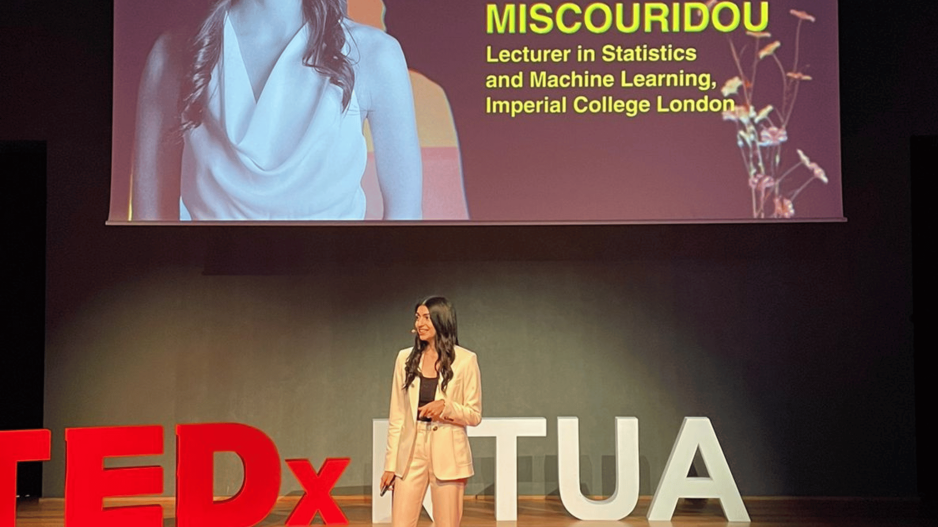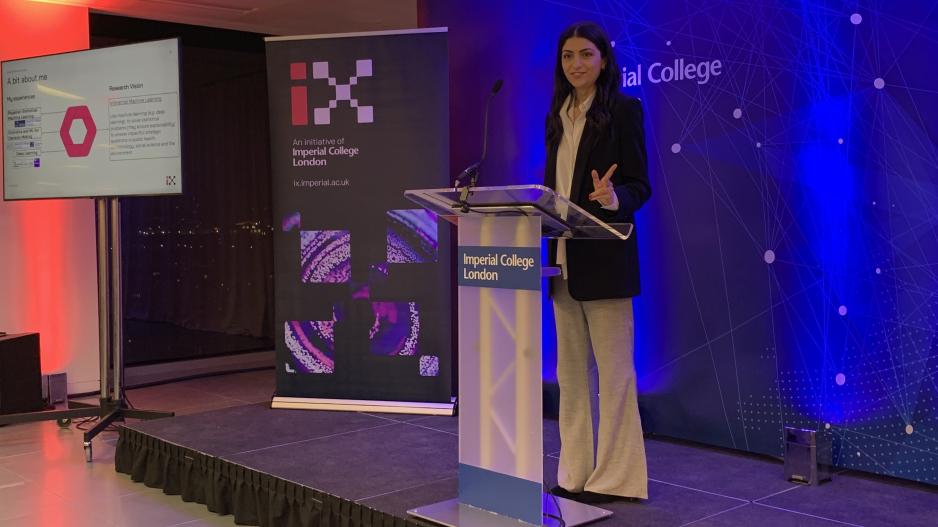Xenia Miscouridou Speaks to FFWD About Machine Learning, Statistics and AI
FFWD is delighted to present an exclusive interview with Xenia Miscouridou, a distinguished lecturer in Statistics and Machine Learning at Imperial College London and the I-X Centre for Artificial Intelligence. With a remarkable career path and accolades that include being listed as one of Forbes' under 30 in Europe in the Science and Healthcare sector, Xenia is a recognized expert in her field. Holding a PhD from the University of Oxford and having conducted research at prestigious institutions like NYU and the Alan Turing Institute, Xenia brings a wealth of knowledge and experience to the discussion of machine learning, statistics, and AI.
Xenia shares profound insights into how statistical machine learning can advance social science, network science, and public health. By combining scalable algorithms of AI with the rigorous theory of probability and statistics, Xenia elucidates the potential for creating explainable frameworks that contribute to the broader social good. Moreover, Xenia delves into the effective integration of AI and machine learning in business processes, highlighting the significance of empowering individuals to utilize AI tools while maintaining a complementary relationship between technology and human professionals. She emphasizes the importance of considering ethical implications when developing and deploying AI technologies, addressing issues such as environmental impact, bias mitigation, and data privacy. Lastly, Xenia shares her own pivotal moments that led her to pursue a career in statistics and machine learning.

To answer questions in social science or public health, you need to process and analyze large data sets in real time. You cannot do this without efficient and scalable algorithms, something that AI methods are great at developing.
The disadvantage of many AI methods is that they are not that explainable nor do they have interpretable parameters. This is where the rigorous theory behind probability/statistics comes in. The combination of the two provides an explainable framework with scalable algorithms that can deliver impact for the broader social good.
An example of such research with huge impact was during the pandemic, where we worked on the synergies of statistics and AI to create algorithms that can model the dynamics of the disease, detect new variants, quantify the transmissibility, and bring conclusions which influenced the public policy measures suggested by WHO.
The first thing is to understand if your business needs AI or not, and then define the framework in which AI can support the operations. Once this is established, then small businesses can easily incorporate AI using off the shelf user-friendly programmes with which do not require heavy technical knowledge or coding skills. These platforms can help analyse data but before that you need to ensure that you have the right data, hence data collection, storage and enhancement is at the core of this. The data analysis using pre-built models is one of the easier parts of the process.
In the coming era of AI we should empower people to use AI for themselves and their jobs
Some examples of how AI can benefit small businesses can be seen in smarter marketing. A local shop or restaurant can use AI for pattern recognition in sales data and giving recommendations on strategies, detect trends to guide demand forecasting or by processing store pictures to suggest where and how to place products inside the store to promote sales. In the coming era of AI we should empower people to use AI for themselves and their jobs, always using AI in a way that compliments and elevates the role of the human professional.
There are several areas of impact involved in AI use and deployment, such as environmental and social. The datasets used to train AI are increasingly large and take an enormous amount of energy to run. Therefore companies should consider how AI systems affect the environment, including their carbon footprint.
On deployment, companies should consider how AI systems do not inherit or reinforce existing societal biases. Especially given the ‘black box’ nature of AI, i.e we do not necessarily understand why and how these systems work, it is even more important to minimize bias in every stage of the life of an AI system.
Finally, the privacy and dignity of AI users must be carefully considered when designing service systems or machines. Companies should be transparent in how the data is used and retained. And how can companies prevent the identity, or personal information of an individual involved in training a model from being discovered. In summary, the environmental impact of AI models, the risk of bias and data privacy are among the most important factors that stakeholders should consider.

I had studied Mathematics as an UG degree but it was during my Master’s degree that I decided to pursue a career in machine learning. I really enjoyed topics in modern statistics and machine learning methods while attending classes from different departments: mathematics, engineering, computer science. It was then that I really fell in love with the area and truly realized the potential of this scientific field.
AI is really changing the world. It drives and shapes the development of technology, through its impact on computing. The field is growing fast with big strides being made each year. AI algorithms today can read, write, speak, move, debate, play games, drive cars. AI is present in every aspect of our lives, changing the scene in education, healthcare, business, communications, transportation while at the same time creating new products and concepts.
There is a lot of buzz around the field so I would first advise them to make sure they enjoy both programming and mathematics as they are at the core of AI. New AI practitioners should make sure they get experience in both practical and theoretical aspects. Furthermore, since a lot of the impact stemming from AI is the ability to convert a business problem into a technical one, people applying AI should have an understanding of both the technical but also commercial aspects of AI.
In recent years, multidisciplinary teams are driving the real impact in the field of AI, with a focus on using AI to tackle questions in fields across sciences, such as materials or biology, and humanities such as restoring ancient text. Therefore someone now entering into the world of AI should enjoy working collaboratively within cross-disciplinary groups.
It is important for the AI developers to consider the ethical and societal implications
This presents an exciting opportunity to focus on an area you are passionate about, e.g. climate change, education or music generation, given AI has broken into so many applications. For this to be successful though, the AI community should work together with domain experts, as otherwise this might lead to either non-meaningful or negative outcomes for the people being subjects of that system. Finally, the impact of the field is so far reaching and progresses so fast, that it is important for the AI developers to consider the ethical and societal implications and I would encourage them to work on meaningful problems that serve the broader social good.
Memory connects to humans, culture, history, architecture, biology. Memory is crucial in how humans form and develop intelligence, however memory is not the same as intelligence. AI algorithms develop a concept of memory that underpins their ‘intelligence’ despite not having consciousness like humans do.
Memory in AI systems works in conjunction with another mechanism that has been developed over the last few years, that of ‘attention’ which is the ability to focus on one thing at a time, attend one thing at a time, remember one event rather than all events when performing a task. This mimics how humans can select the signal out of noise, and pick the important information they need when bombarded with lots of information.
However, by no means artificial intelligence is the same as human intelligence. Humans learn, think, and remember in much more sophisticated ways and they also forget in different ways. It’s crucial that we incorporate the ability to forget into AI systems, so we can remove the influence of data from the system when that data is flawed, inappropriate, outdated or not valid anymore without the need to retrain the whole model.







